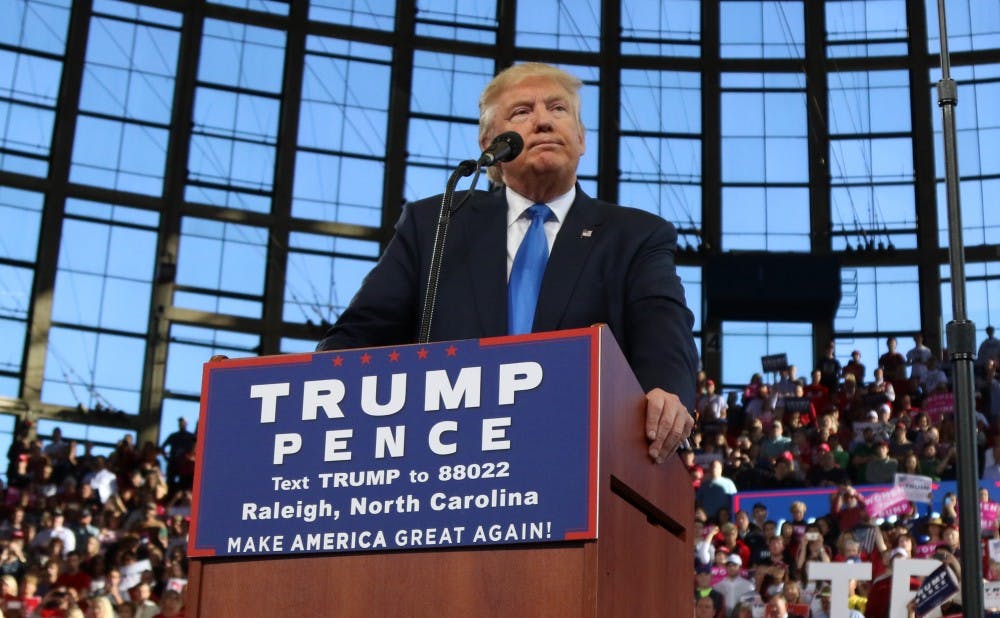On May 4, President Donald Trump signed an executive order “promoting free speech and religious liberty”—specifically seeking to push back on aspects of the Johnson Amendment.
“Today, my administration is leading by example as we take historic steps to protect religious liberty in the United States of America,” Trump said, to an applause in the White House’s Rose Garden. “We will not allow people of faith to be targeted, bullied or silenced anymore—and we will never, ever stand for religious discrimination. Never, ever.”
The order—which was largely overshadowed by the House of Representatives passing a bill to repeal and replace the Affordable Care Act on the same day—appears to be Trump’s attempt to fulfill a promise at the National Prayer Breakfast in February to “totally destroy” the Johnson Amendment.
The Johnson Amendment is a 1954 law that prohibits tax-exempt 501(c)(3) organizations, including churches and nonprofits, from publicly endorsing or opposing political candidates, but does not prohibit them from otherwise participating in politics, such as through hosting events or registering voters.
But the careful language of Trump’s mandate steers clear of challenging the legal precedents in place, so what effects will this executive order have in practice?
“It remains fine for clergy and churches to speak out on moral issues, and that’s always been fine and it’s still fine—but it’s not fine to outright endorse or oppose a candidate,” said Mark Chaves, professor of sociology, religious studies and divinity. “I mean, I’m not a lawyer, but I don’t think the order changes that. I saw somebody called it a photo-op, and that’s what it looks like to me too.”
Trump’s order specifically targeted religious organizations that fall under the 501(c)(3) tax-exempt status, instructing agencies “to the greatest extent…permitted by law, respect and protect the freedom of persons and organizations to engage in religious and political speech.”
Additionally, the order called on the Department of the Treasury to not “take any adverse action” against religious groups or people that “speaks or has spoken about moral or political issues from a religious perspective,” noting that this type of speech was not previously considered unlawful if it was not construed as endorsing or opposing a particular candidate.
Trump also used the opportunity to address preventative care, tacking on a section that instructs some agencies to “consider issuing amended regulations, consistent with applicable law, to address conscience-based objections to the preventive-care mandate” in Title 42 of U.S. Code.
The order also includes a clause stating that it “shall be implemented consistent with applicable law.”
“I was struck when I read it that it kind of goes out of its way, with the language ‘to the extent allowable by law’—it seems to me like it kind of goes out of the way to not imply that it is changing anything about the current rules,” said Chaves. “It’s kind of striking, really, how little it actually does.”
Only one church has ever lost its tax-exempt status from violating the provisions outlined in the Johnson Amendment, according to The New York Times, and each year clergy will tape sermons that they think push back on the amendment and mail them to the Internal Revenue Service as part of Pulpit Freedom Sunday. The Alliance Defending Freedom, a national organization that supports Pulpit Freedom Sunday and opposes the Johnson Amendment, applauded the order for providing "hope," but noted that Trump still had work to do to fulfill his promise to “totally destroy” the amendment.
“As we have explained, though we appreciate the spirit of today’s gesture, vague instructions to federal agencies simply leaves them wiggle room to ignore that gesture, regardless of the spirit in which it was intended,” said Michael Farris—CEO, president and general counsel of ADF—in a press release.
If Trump’s executive order legalized the explicit endorsement of candidates from the pulpit, the question remains of how many churches would want to take advantage of that. Chaves said he doubts that many churches would be interested in such direct political action. In 2018, one of the questions Chaves said that he will pose to clergy while conducting the National Congregations Survey is how interested they are in endorsing or opposing specific candidates.
“It’s clear that many, many churches have no desire to do that, and I think probably that the vast majority have no desire to publicly endorse or oppose candidates because they don’t want to alienate the people in their churches that are on the other side,” he said. “But, we don’t know.”
He noted, however, that it was clear that some churches were interested in such actions. The ADF contends that 4,100 pastors “agree the Johnson Amendment must end.”
Generally, Chaves said that his reading of the order led him to believe that, in practice, very little has changed from before Trump signed the order.
“I think the main point is that it doesn’t actually change anything, and it’s not clear how much support there is, even among churches," he said ."To me, an interesting question is ‘to what extent do churches actually want to do this if they could. I think that’s a pretty small number, but that’s the question I’m hoping [to answer] with the survey next year.”
Get The Chronicle straight to your inbox
Signup for our weekly newsletter. Cancel at any time.
Bre is a senior political science major from South Carolina, and she is the current video editor, special projects editor and recruitment chair for The Chronicle. She is also an associate photography editor and an investigations editor. Previously, she was the editor-in-chief and local and national news department head.
Twitter: @brebradham
Email: breanna.bradham@duke.edu

